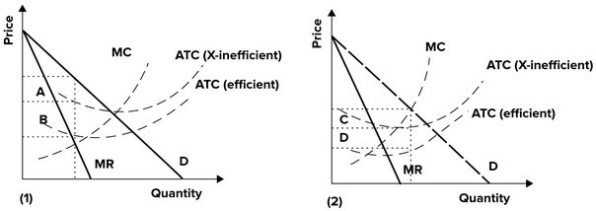Exam 16: Real-World Competition and Technology
Exam 1: Economics and Economic Reasoning121 Questions
Exam 2: The Production Possibility Model, Trade, and Globalization111 Questions
Exam 3: Economic Institutions144 Questions
Exam 4: Supply and Demand151 Questions
Exam 5: Using Supply and Demand136 Questions
Exam 6: Describing Supply and Demand: Elasticities176 Questions
Exam 7: Taxation and Government Intervention169 Questions
Exam 8: Market Failure Versus Government Failure160 Questions
Exam 9: Comparative Advantage, Exchange Rates, and Globalization107 Questions
Exam 10: International Trade Policy82 Questions
Exam 11: Production and Cost Analysis I160 Questions
Exam 12: Production and Cost Analysis II129 Questions
Exam 13: Perfect Competition137 Questions
Exam 14: Monopoly and Monopolistic Competition231 Questions
Exam 15: Oligopoly and Antitrust Policy111 Questions
Exam 16: Real-World Competition and Technology86 Questions
Exam 17: Work and the Labor Market130 Questions
Exam 18: Who Gets What the Distribution of Income100 Questions
Exam 19: The Logic of Individual Choice: the Foundation of Supply and Demand134 Questions
Exam 20: Game Theory, Strategic Decision Making, and Behavioral Economics76 Questions
Exam 21: Thinking Like a Modern Economist67 Questions
Exam 22: Behavioral Economics and Modern Economic Policy87 Questions
Exam 23: Microeconomic Policy, Economic Reasoning, and Beyond111 Questions
Select questions type
Reverse engineering is the process of a firm buying other firms' products and:
(Multiple Choice)
4.9/5  (37)
(37)
Across the United States, fire departments are fighting with private companies over the right to respond to medical emergencies. Each side will fight harder the:
(Multiple Choice)
4.9/5  (34)
(34)
According to the phrase, "competition is for losers," a goal of all firms is to:
(Multiple Choice)
4.8/5  (30)
(30)
Suppose a lazy monopolist's fixed costs are higher than the fixed costs of an efficient monopolist. In all other respects the monopolists are the same. Which of the following statements about this lazy monopolist is true?
(Multiple Choice)
4.9/5  (41)
(41)
A firm will spend money on a program to develop or protect its monopoly position until the:
(Multiple Choice)
4.8/5  (46)
(46)
Suppliers would be less eager to organize to restrict output if they faced a:
(Multiple Choice)
4.8/5  (35)
(35)
Economic reasoning predicts that there will be strong pressures to make real-world markets perfectly competitive.
(True/False)
4.9/5  (35)
(35)
Which of the following is an example of the monitoring problem?
(Multiple Choice)
4.8/5  (41)
(41)
Which of the following is a legal right to control who may produce a good?
(Multiple Choice)
4.8/5  (38)
(38)
In practice, regulatory boards try to set the price of a natural monopoly so that price covers a normal return on capital investment. As a result:
(Multiple Choice)
4.8/5  (41)
(41)
In practice, regulatory boards try to set the price of a natural monopoly so that price:
(Multiple Choice)
4.8/5  (34)
(34)
If firms have to spend money on creating and protecting their monopoly power, they're going to buy:
(Multiple Choice)
4.9/5  (36)
(36)
Refer to the graphs shown.  The maximum profits that a lazy monopolist whose average total costs are given by the ATC (X-inefficient) curve but who still produces the profit-maximizing quantity might earn is best shown by the area:
The maximum profits that a lazy monopolist whose average total costs are given by the ATC (X-inefficient) curve but who still produces the profit-maximizing quantity might earn is best shown by the area:
(Multiple Choice)
4.7/5  (40)
(40)
Soda companies pay universities for the exclusive right to sell their products on campus. For example, the University of Buffalo agreed to sell only Pepsi on campus in exchange for $220,000 per year. This agreement:
(Multiple Choice)
4.8/5  (34)
(34)
The fact that U.S. managers' salaries are about four times higher than those of comparable managers in Japan, where banks control firms more closely, is probably:
(Multiple Choice)
4.8/5  (42)
(42)
Showing 21 - 40 of 86
Filters
- Essay(0)
- Multiple Choice(0)
- Short Answer(0)
- True False(0)
- Matching(0)